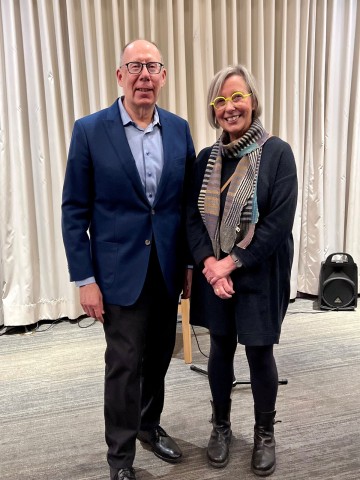
Words: Helping to Make Business Communication Clear, not Cloudy. Jonathan Berkowitz examines the fascinating and amusing world of the English language

From jargon at business meetings to clichés in our social interactions, UBC Sauder Lecturer Jonathan Berkowitz is on a mission to re-examine how we use the English language. His latest book, Tales From the Word Guy: What Your English Teacher Never Taught You, helps readers appreciate the often overlooked history and beauty of the words, phrases and other intriguing parts of the English language we frequently take for granted.
Dr. Berkowitz is a member of the Operations and Logistics Division for whom he teaches introductory business statistics to BCom students. But his students appreciate more than his expertise at explaining statistics. They have come to count on him for his skill at weaving into his lessons the history, backstories, evolution, and trivia of words and phrases in the English language.
Tales From the Word Guy is a companion to his previous book on word puzzles The Whirl of Words: Puzzling Past and Present. With his new book, Berkowitz opens up his masterclass on the English language to the world. The book is based on his Word Guy columns which air on CBC Radio One’s North by Northwest, hosted by Sheryl MacKay until her retirement at the end of December 2022.
For over seven years, Berkowitz and MacKay used the power of public radio to bring the fascinating and amusing English language to listeners around the province. The Word Guy will continue now with a new program host.
A box of (word) chocolates
His book includes 57 North by Northwest segments, and takes readers on a journey through the history, development, structure, use, and misuse of English.

“The focus of this book is on the marvels of the English language, which really has become a global language,” says Berkowitz.
Berkowitz's book is divided into six parts, covering aspects such as the surprising origins of words, evolution of meanings and spellings of words, and how other languages like French, Latin, and Greek have contributed to our lexicon. There is even a refresher on grammar, syntax, and parts of speech.
“I describe it as akin to a box of chocolates … 'word chocolates.' You can sample anything you want. You never know what you're going to get in each of these beautiful and tasty little pieces,” says Berkowitz.
“You'll be educated and entertained at the same time. That's the hallmark of my writing and my teaching.”
Business jargon examined
To illustrate, Berkowitz spotlights jargon. Its liberal and often careless use in business-speak has earned the business professor’s ire, and a place in his new book.
“You find a lot of gobbledygook in the business world, like ‘core competencies.’ What exactly are core competencies? Does anyone ever talk about ‘peripheral competencies’?” He elaborates: “Competent means it’s an ability; it doesn’t mean it’s a fundamental strength. So, a ‘core competency’ is rather a meaningless phrase.”
Berkowitz has strong opinions about several pieces of jargon that arise frequently in business and corporate communication.
Best practice.
“This is a remarkably pompous term. Just do the best you can. What is ‘best practice’?”
Moving parts.
“Well, a pinball machine has a lot of moving parts. Do you want your business to run like a noisy pinball machine?”
Think outside the box.
“What does a box have anything to do with this? Isn't it sufficient just to encourage people to think?”
Give 110 per cent.
“This is probably the one that drives me the craziest because you can’t give more than 100 per cent. That’s all there is!”
“Jargon is supposed to be a specialized language in the world of business,” explains Berkowitz. “But when you examine jargon closely, you realize it is a set of placeholders when people haven’t quite figured out what the point is that they’re trying to make.”
Helping business students become effective communicators
Beyond giving people pause and making them examine more deeply their use of the language, Berkowitz says the book has practical lessons for business students, especially at UBC Sauder.
Berkowitz underscores that students’ vocabulary is steadily shrinking, and this could have a detrimental effect in the workplace.
“If business students plan to do any kind of business writing, if they’re going to make an elevator pitch, if they’re trying to market themselves—then the words they use provide the first evidence that they have something to offer to the interviewer. And this extends to the customer they’re trying to reach with a product, or an audience they’re trying to attract with a message,” says Berkowitz.
“So, if business students can use the right words in the right way, and not fall into these traps of using words without knowing their meanings or simply parroting jargon, they’re going to be ahead of the game.”
Berkowitz says his book is a useful addition to everyone’s toolkit. And whether you’re a business student eager to impress an employer or just curious about the English language, there’s something for everyone.
“If you're sitting all by yourself reading the book, you’ll be smiling, and you might even laugh out loud at some of the ways that the language can go wrong. And you may say to yourself, ‘Wow, I never actually thought about that!’”
To read excerpts from Tales From the Word Guy, visit
https://www.talesfromthewordguy.com/excerpts